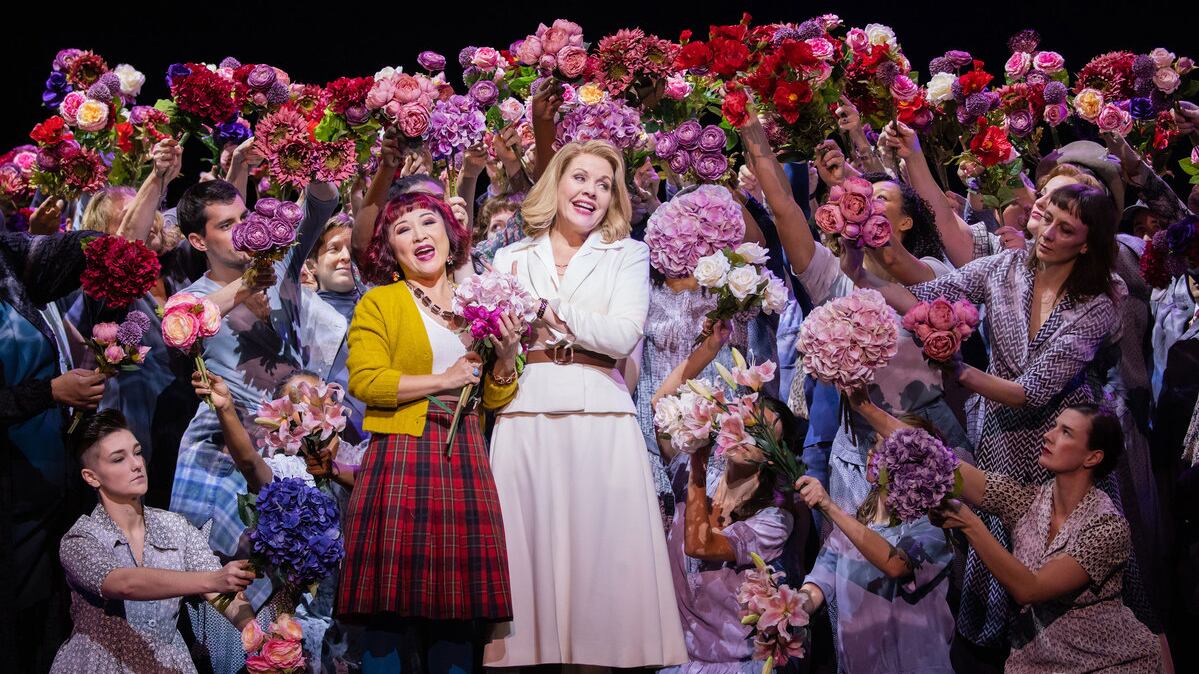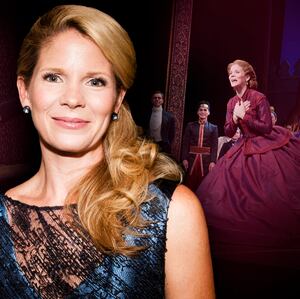The most striking and effective thing in the Metropolitan Opera and Philadelphia Orchestra’s operatic adaptation of The Hours (to Dec 15), conducted by Yannick Nézet-Séguin, is its taking full narrative advantage of having its three lead female characters on stage.
That physical proximity, and Phelim McDermott’s intelligent reading of Michael Cunningham’s best-selling novel (the score is by Kevin Puts and libretto by Greg Pierce), brings to intimate and evocative life the correspondences and echoes thrumming between feminist novelist Virginia Woolf (Joyce DiDonato) in 1923, Laura Brown (Kelli O’Hara), a Los Angeles housewife in 1949, and book editor Clarissa Vaughan (Renée Fleming) in New York in 1999.
The formats of book and film mean this shared stage presence is impossible; here instead we get to see scenes and voices sometimes overlapping, or characters remaining on stage in quiet or semi-frozen rest, as another character plays out a scene.
The central recurring reverberation between the eras is the novel Mrs. Dalloway. Woolf is writing it in her portion; Laura is reading it in hers; and Clarissa not only shares the protagonist’s first name, but she (like the original Mrs. D) is planning a party—this one for Richard (Kyle Ketelson), her longtime friend and a novelist with AIDS, who has had enough of his life. He even calls her Mrs. Dalloway—the modern Clarissa allegedly possesses the charisma of her fictional antecedent.
Just as in Cunningham’s novel and Stephen Daldry’s multi-award nominated and winning 2002 movie (for which Nicole Kidman won an Oscar as Woolf), we follow one day in the lives of all three women. As you take your seats, a large clock on stage shows the real-life time ticking away.
On stage, a rather measly-looking portion of each of the women’s homes (sets and costumes by Tom Pye) signifies them and their eras. The three slices of era-specific decor ring strangely insubstantial, but the drapes that unfurl dramatically around them are piercing additions to the swings in time and circumstance before us. We have the yellow sunniness of Laura’s kitchen where she is determined to bake a cake for husband Dan (Brandon Cedel), with the help of son Richie (young Kai Edgar), but we see immediately as she lies on her bed Laura’s depression and restlessness. She loves her family, but she is shriveling inside.
Suicide, its specter and discontents, haunts all three women. Leonard Woolf (Sean Panikkar) is terrified that Virginia will harm herself directly or indirectly—DiDonato plays her twitching with fury at interruptions, at her husband and maid Nelly’s (Eve Gigliotti) desperate ministrations to eat. She wants to write, to be left alone, and later suicidal fantasies will begin to stalk her. Meanwhile Clarissa, living with partner Sally (Denyce Graves) in a brick-walled loft, is decked out in angelic white. It may be just one day, but for all three women moments of change are about to unfold. They share agonies, desire, depression, determination—and all the time battling an unseen clock.

Kelli O'Hara as Laura Brown, Renée Fleming as Clarissa Vaughan, and Joyce DiDonato as Virginia Woolf in 'The Hours.'
Evan Zimmerman/Met OperaThe opera is around three hours long, with one intermission. The first half is around two hours, the last about an hour—meaning that the first half has the languorous feel of an unfolding novel, or the most discursive parts of the movie. Some may, like this critic, enjoy the slow unfurling; some may find it a drag.
Unlike both its forbears, the opera introduces a bizarre human chorus to fill out the stage. This chorus appears to be a manifestation of the women’s anxieties and impulses, and feels cluttering and unnecessary, except when doing something visually inventive such as raising many flowers in the air—flowers being the predominant symbol in Mrs. Dalloway and in The Hours, of mourning, joy, and reflection. The chorus, dressed in grey, marches and flows this way and that, like a kind of misery army. If their presence is symbolic it’s overstated and overwrought; the women tell us how they are feeling, after all.
What Clarissa’s unexpected kiss with florist Barbara (Kathleen Kim) means is Clarissa’s less well told B-story, her failing relationship to Sally—for this critic one of the most unfairly underwritten characters on stage. Clarissa imparts to us how much she wants to escape the relationship, but we only ever see Sally being sensibly and quietly supportive to her partner—quite what is wrong with them, and why she is “silly,” as Clarissa calls her, is never made clear. Sally, and Denyce Graves, deserve better.
The audience at Tuesday night’s gala opening was understandably ecstatic to see three such huge stars together on stage, and standing ovations were duly delivered. O’Hara acted the role most convincingly towards the audience, giving The Hours’ most moving strand its vital heart, and also leading to one of the show’s most quietly stunning moments—her transformation from young Laura to old Laura right in front of us, as she prepares to meet Clarissa, and we see that the little Richie we see in the 1950’s is the adult Richard in 1999. DiDonato gave Woolf a sharp sense of authority-meets-otherness. Fleming’s voice seemed more restrained, which—coupled with her character’s constantly tortured and stricken expression—slightly froze the transmission of her performance.
The aftermath of the most tragic event on stage—and we are told over and over again someone will die this very day—felt like a rush to find optimism, a bizarrely undermining choice as The Hours headed towards its conclusion.
The opera most significantly also makes the decision not to adapt one of the most stunning sequences of the film adaptation—Virginia’s suicidal walk into the river, which begins and ends the movie. Instead, we see a kind of mash-up of some of her final words, and words said to Leonard when he finds her on a railway station platform—and she ultimately lives to the end of the opera.
The stories of the three women are told so faithfully and carefully in the first half, the second half glides over or glides too quickly from one emotional transition to another to a weakly stated conclusion—which, far from an implied suicide, is a collective declaration that life is life, and we are all here living it, and we should make the best of that with the love and people we have around us. The movie chose death as its bounding theme, the opera chooses life.
This, while sung resonantly and beautifully by DiDonato, O’Hara, and Fleming—their characters now connected having escaped the bounds of time—seemed like a wilting, inadequate end-note to the sublime emotional knots and interrogations of what had preceded it. Perhaps The Hours could do with an extra hour—and one more intermission—to really give the women the time they need to reach more richly realized destinies.







